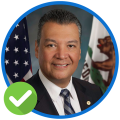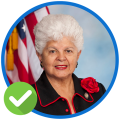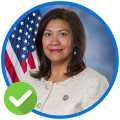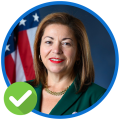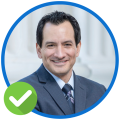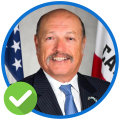Reelect State Senate Representative Archuleta to keep SD-30 on the right track for progress.
Sen. Archuleta has a history of supporting bad bills and not voting for progressive bills. This is a safe district and once elected, he will need to be held accountable by voters in SD-30 and will need to be pressured to govern effectively in the best interest of this diverse district.
Progressive Endorsements: Sen. Archuleta has the endorsement of some progressive groups, including Orange County Labor Federation and National Union of Health Workers (NUHW).
Top issues: The environment and housing.
Priority bills: This year, Sen. Archuleta’s priorities for SD-30 have included 49 bills about environmental issues and real estate. Of these, 21 have successfully been passed by the state Senate. He has sponsored and passed legislation to require any trash receptacle larger than three feet to have reflective fluorescent taping, and a bill to protect immigrants’ addresses during background checks for situations when supervisory or disciplinary power over a minor or another in their care. He scores a CS of 79 out of 100 on Courage Score, our annual analysis of legislators’ progressive voting records. Based on our Courage Score analysis, Sen. Archuleta has supported some progressive bills that made it to a vote. That said, Sen. Archuleta has not supported prohibiting prosecutors from striking prospective jurors from jury pools on the basis of race, ethnicity, gender, and other identities, ending minimum sentences for nonviolent drug crimes, or setting carbon neutrality goals for 2045.
Committee leadership/membership: Sen. Archuleta currently serves on five standing committees and one select committee, including the Military and Veterans’ Affairs Committee.
Governance and community leadership experience: Sen. Archuleta has served in this state Senate seat since 2018, when he was elected with over 66% of the vote.
Prior to his election to the state Senate, Sen. Archuleta was appointed by President Barack Obama as a member of the Board of Visitors to the United States Military Academy at West Point. Sen. Archuleta has been a longtime supporter of the military.
The Race
Primary election results: The June 2022 results included Archuleta (D), 36%; Mitch Clemmons (R), 34%; and Martha Camacho-Rodriguez (R), 16%. Archuleta and Clemmons will compete in a run-off in the November 8 general election.Candidate fundraising and pledges: Sen. Archuleta campaign has raised $1,860,084 and is funded by police money, corporate PACs, real estate money, and fossil fuel money.
Opposing candidate: Republican Mitch Clemmons
Opposing candidate’s fundraising and pledges: Clemmons’s campaign has raised $5,000 and is funded by primarily individual donors.
The District
Counties in district: California’s 30th State Senate District includes parts of Los Angeles and Orange Counties.Voter registration: 49% Democrat, 21% Republican, and 24% No Party Preference. Democrats have held this district since at least. Since the 2021 redistricting process, SD-30 is about the same as it was in the 2020 cycle.
District demographics: 57% Latino, 20% Asian, and 4% Black. This district is considered to be one of the strong Latino seats in the California State Senate delegation.
Recent election results: SD-30 voted for Biden for president in 2020 by 32 points and Newsom for governor in 2018 by 30 points.
The Position
State senators represent and advocate for the needs of their district constituents at the California State Capitol. They are responsible for creating, debating, and voting on legislation that addresses issues within their district.The California State Senate has 40 districts. Each represents a population of about 930,000 Californians. Representatives are elected to the Senate for a four-year term. Every two years, half of the Senate's 40 seats are subject to election. Members elected before 2012 are restricted to two four-year terms (eight years) in the Senate. Those elected in or after 2012 are allowed to serve 12 years total across both the state Senate or Assembly. This term, Democrats currently hold a two-thirds supermajority of 31 seats in the California State Senate, while Republicans hold 9 seats.
Reelect State Senate Representative Archuleta to keep SD-30 on the right track for progress.
Sen. Archuleta has a history of supporting bad bills and not voting for progressive bills. This is a safe district and once elected, he will need to be held accountable by voters in SD-30 and will need to be pressured to govern effectively in the best interest of this diverse district.
Progressive Endorsements: Sen. Archuleta has the endorsement of some progressive groups, including Orange County Labor Federation and National Union of Health Workers (NUHW).
Top issues: The environment and housing.
Priority bills: This year, Sen. Archuleta’s priorities for SD-30 have included 49 bills about environmental issues and real estate. Of these, 21 have successfully been passed by the state Senate. He has sponsored and passed legislation to require any trash receptacle larger than three feet to have reflective fluorescent taping, and a bill to protect immigrants’ addresses during background checks for situations when supervisory or disciplinary power over a minor or another in their care. He scores a CS of 79 out of 100 on Courage Score, our annual analysis of legislators’ progressive voting records. Based on our Courage Score analysis, Sen. Archuleta has supported some progressive bills that made it to a vote. That said, Sen. Archuleta has not supported prohibiting prosecutors from striking prospective jurors from jury pools on the basis of race, ethnicity, gender, and other identities, ending minimum sentences for nonviolent drug crimes, or setting carbon neutrality goals for 2045.
Committee leadership/membership: Sen. Archuleta currently serves on five standing committees and one select committee, including the Military and Veterans’ Affairs Committee.
Governance and community leadership experience: Sen. Archuleta has served in this state Senate seat since 2018, when he was elected with over 66% of the vote.
Prior to his election to the state Senate, Sen. Archuleta was appointed by President Barack Obama as a member of the Board of Visitors to the United States Military Academy at West Point. Sen. Archuleta has been a longtime supporter of the military.
The Race
Primary election results: The June 2022 results included Archuleta (D), 36%; Mitch Clemmons (R), 34%; and Martha Camacho-Rodriguez (R), 16%. Archuleta and Clemmons will compete in a run-off in the November 8 general election.Candidate fundraising and pledges: Sen. Archuleta campaign has raised $1,860,084 and is funded by police money, corporate PACs, real estate money, and fossil fuel money.
Opposing candidate: Republican Mitch Clemmons
Opposing candidate’s fundraising and pledges: Clemmons’s campaign has raised $5,000 and is funded by primarily individual donors.
The District
Counties in district: California’s 30th State Senate District includes parts of Los Angeles and Orange Counties.Voter registration: 49% Democrat, 21% Republican, and 24% No Party Preference. Democrats have held this district since at least. Since the 2021 redistricting process, SD-30 is about the same as it was in the 2020 cycle.
District demographics: 57% Latino, 20% Asian, and 4% Black. This district is considered to be one of the strong Latino seats in the California State Senate delegation.
Recent election results: SD-30 voted for Biden for president in 2020 by 32 points and Newsom for governor in 2018 by 30 points.
The Position
State senators represent and advocate for the needs of their district constituents at the California State Capitol. They are responsible for creating, debating, and voting on legislation that addresses issues within their district.The California State Senate has 40 districts. Each represents a population of about 930,000 Californians. Representatives are elected to the Senate for a four-year term. Every two years, half of the Senate's 40 seats are subject to election. Members elected before 2012 are restricted to two four-year terms (eight years) in the Senate. Those elected in or after 2012 are allowed to serve 12 years total across both the state Senate or Assembly. This term, Democrats currently hold a two-thirds supermajority of 31 seats in the California State Senate, while Republicans hold 9 seats.

